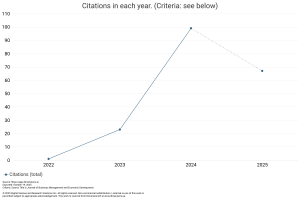Effect of Financial Literacy on the Financial Behavior of the Millennial Generation about the Dangers of Fraudulent Investment and Flexing Affiliations
DOI:
https://doi.org/10.59653/jbmed.v1i02.154Keywords:
Financial Literacy, Financial Behavior, Millennial Generation, Fraudulent Investment, Malang CityAbstract
This research presents insights into the impact of fraudulent investments spread by irresponsible influencers and affiliates on the millennial generation in Malang City. In addition, this study aims to determine the effect of financial literacy on the financial behavior of millennials in the city. This study uses a quantitative approach with descriptive analysis to explain the relationship between financial literacy variables and financial behavior. The main data was collected through an online survey with questionnaires distributed through social media platforms as well as through in-depth interviews with respondents who had been victims of fraudulent investments. The results showed that financial literacy has a significant effect on the financial behavior of the millennial generation in Malang City. Millennials with a high level of financial literacy tend to show better financial behavior, including in money management, investment, and debt management. It is hoped that the results of this study can raise awareness about the importance of financial literacy and help millennials make wise financial decisions
Downloads
References
Amanah, E., Iradianty, A., & Rahardian, D. (2016). Pengaruh Financial Knowledge, Financial Attitude Dan External Locus of Control Terhadap Personal Financial Management Behavior Pada Mahasiswa S1 Universitas. Telkom e-Proceeding of Management, 3(2), 1228– 1235.
Agarwalla, S. K., Barua, S. K., Jacob, J., & Varma, J. (20015) Financial Literacy among Working Young in Urban India. Financial Literacy among Working Young in Urban India. World Development, 67(C), 101-109. https://doi.org/10.1016/j.worlddev.2014.10.004
Chairani, R., Bestari, M. F. O., & Hidayat, F. S. (2021). Analisa Pengaruh Literasi Keuangan Terhadap Keputusan Investasi. Jurnal Sains Sosio Huaniora, 5(1), 691-698. https://doi.org/10.22437/jssh.v5i1.15427
Chen, Haiyang & Volpe, Ronald. (1998). An Analysis of Personal Financial Literacy Among College Students. Financial Services Review. 7. 107-128. https://doi.org/10.1016/S1057-0810(99)80006-7
Das, S. C (2016). Financial Literacy among Indian Millennial Generation and their Reflections on Financial Behaviour and Attitude: An Explanatory Research. The Indian Journal Of Commerce, 69 (4), 16-34.
de Bassa Scheresberg. (2013). Financial Literacy and Financial Behavior among Young Adults: Evidence and Implications. Numeracy, 6(2), 1-21. http://dx.doi.org/10.5038/1936-4660.6.2.5
Delkamp, Morgan. (2018). Affiliate Marketing Campaign With Social Media Micro-Influencers. Degree Programme in International Business, 1-50. https://www.theseus.fi/handle/10024/156507
Detik Jateng. (2022). (Online), https://www.detik.com/jateng/hukum-dan-kriminal/d-6408224/duh-ratusan-mahasiswa-ipb-terjerat-pinjol-gegara-tergiur-investasi-bodong, Diakses pada 19 Juni 2023.
Dew, J. P., & Xiao, J. J. (2011). The Financial Management Behavior Scale: Development and Validation. Faculty Publications, 22(1), 43–59, dari http://afcpe.org/journal-articles.php?volume=387&article=403
Faramitha, A., Wahyudi., & Desmintari. (2021). Analisis perilaku manajemen keuangan pada generasi milenial. INOVASI: Jurna Ekonomi, Keuangan dan Manajemen, 17(1), 19-29, dari https://journal.feb.unmul.ac.id/index.php/INOVASI/article/view/9216
Friedline, T., & West, S. (2016). Financial Education is not Enough: Millennials May Need Financial Capability to Demonstrate Healthier Financial Behaviors. Journal of Family and Economic, 37(4), 649-671. https://doi.org/10.1007/s10834-015-9475-y
Garman, E. T., & Forgue, R. (2014). Personal finance. Cengage Learning.
Griskeuvicius, V., & Kenrick, D. T. (2013.) Fundamental motives: How evolutionary needs influence consumer behavior. Journal of Consumer Psychology, 23(3), 372–386. http://dx.doi.org/10.1016/j.jcps.2013.03.003
Herd, P., Holden, K., & Su, Y. T. (2012). The links between early‐life cognition and schooling and late‐life financial knowledge. Journal of Consumer Affairs, 46(3), 411–435, https://doi.org/10.1111/j.1745-6606.2012.01235.x
IDN Times. (2019). Indonesia Millennial Report 2019. https://ims.idntimes.com/report, Diakses 3 Februari 2023.
Jelen, G. F., & Williams, J. R. (1998). A practical approach to measuring assurance. Proceedings 14th Annual Computer Security Applications Conference. 333-343. https://doi.org/10.1109/CSAC.1998.738653
Lintner, G. (1998) Behavioral Finance: Why Investors Make Bad Decisions. The Planner, 13(1), 1-8.
Lusardi, A., & Mitchell, O. S. (2007). Baby Boomer retirement security: The roles of planning, financial literacy, and housing wealth. Journal of Monetary Economics, 54(1), 205–224. https://doi.org/10.1016/j. jmoneco.2006.12.001
Mathur, M., Narayanan, A., &Chetty, M. (2018). Endorsements on Social Media: An Empirical Study of Affiliate Marketing Disclosures on YouTube and Pinterest. In Proceedings of the ACM on Human-Computer Interaction, 2(119), 1-26. https://doi.org/10.48550/arXiv.1809.00620
Mottola, Gary. (2015). The Financial Capability of Young Adults: A Generational View. FINRA Foundation Financial Capability Insights, 1-12. http://dx.doi.org/10.13140/RG.2.1.3800.5281
OECD. (2012). OECD/INFE high-level principles on national strategies for financial education. OECD Publishing.
Potrich, A. C. G., Vieira, K. M., & Mendes-Da-Silva, W. (2016). Development of a financial literacy model for university students. Management Research Review, 39(3), 356–376.
Puspita, G., & Isnalita. (2019). Financial Literacy: Pengetahuan, Kepercayaan Diri dan Perilaku Keuangan Mahasiswa Akuntansi. Owner: Riset & Jurnal Akuntansi, 3(2), 117-128. https://doi.org/10.33395/owner.v3i2.147
Qurotaa’yun, Z., & Krisnawati, A. (2019). Pengaruh Literasi Keuangan Terhadap Perilaku Konsumtif Generasi Milenial Di Kota Bandung. JAF (Journal of Accounting and Finance), 3(1), 46-53, https://doi.org/10.25124/jaf.v3i1.2167
Renata, A. W., & Wiryawan, B. S. (2021). Perilaku Keuangan Pada Generasi Milenial Studi Kasus Pada Beberapa Perguruan Tinggi Swasta Di Bandung. Journal of Accounting and Business Studi, 6(1), 81-105, dari https://journal.ithb.ac.id/JABS/article/view/515
Safryani, U., Aziz, A., &Triwahyuningtyas, N. (2020). Analisis Literasi Keuangan, Perilaku Keuangan, Dan Pendapatan Terhadap Keputusan Investasi. Jurnal Ilmiah Akuntansi Kesatuan, 8(3), 319 - 332. https://doi.org/10.37641/jiakes.v8i3.384
Sandi, K., Worokinasih, S., M.Sc., & Darmawan, A. (2020) Pengaruh financial knowledge, financial confidence, financial self-efficacy, dan financial attitude terhadap financial behaviour (Studi pada youth entrepreneur yang menjalankan bisnis startup di Kota Malang). Profit: Jurnal Administrasi Bisnis, Special Issue (Ekosistem Start Up), 140-150. https://profit.ub.ac.id
Schwartz, Kylie. (2023). Does Lack of Financial Literacy Lead to Subpar Financial Decision Making in College Students?. Management and Human Resources Management, Thesis Undergraduate Project. http://hdl.handle.net/20.500.12680/b8515w02b
Shefrin, H. (2000). Beyond Greed and Fear: Understanding Behavioral Finance and Psychology of Investing. Harvard Bussiness School Press.
Siaran Pers: Survei Nasional Literasi dan Inklusi Keuangan Tahun. 2022. (Online), https://ojk.go.id/id/berita-dan-kegiatan/siaran-pers/Pages/Survei-Nasional-Literasi-dan-Inklusi-Keuangan-Tahun-2022.aspx, diakses 03 Februari 2023.
Suryanto. (2017). Pola Perilaku Keuangan Mahasiswa Di Perguruan Tinggi. Jurnal Ilmu Politik dan Komunikasi, 7(1), 11-19.
Wagland, Suzanne & Taylor, Sharon. (2009). When it Comes to Financial Literacy, is Gender Really an Issue?. Australasian Accounting Business and Finance, 3(1), 13-25. http://ro.uow.edu.au/aabfj/vol3/iss1/3
Downloads
Published
How to Cite
Issue
Section
License
Copyright (c) 2023 Nadia Prima Indratirta, Puji Handayati, Dodik Juliardi

This work is licensed under a Creative Commons Attribution-ShareAlike 4.0 International License.
Authors who publish with this journal agree to the following terms:
- Authors retain copyright and grant the journal right of first publication with the work simultaneously licensed under a Creative Commons Attribution-ShareAlike that allows others to share the work with an acknowledgement of the work's authorship and initial publication in this journal.
- Authors are able to enter into separate, additional contractual arrangements for the non-exclusive distribution of the journal's published version of the work (e.g., post it to an institutional repository or publish it in a book), with an acknowledgement of its initial publication in this journal.
- Authors are permitted and encouraged to post their work online (e.g., in institutional repositories or on their website) prior to and during the submission process, as it can lead to productive exchanges, as well as earlier and greater citation of published work (See The Effect of Open Access).





























